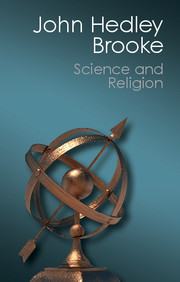Book contents
- Frontmatter
- Dedication
- Contents
- Acknowledgments
- Introduction
- I Interaction between Science and Religion: Some Preliminary Considerations
- II Science and Religion in the Scientific Revolution
- III The Parallel between Scientific and Religious Reform
- IV Divine Activity in a Mechanical Universe
- V Science and Religion in the Enlightenment
- VI The Fortunes and Functions of Natural Theology
- VII Visions of the Past: Religious Belief and the Historical Sciences
- VIII Evolutionary Theory and Religious Belief
- Postscript Science and Religion in the Twentieth Century
- Bibliographic Essay
- Sources of Quotations
- Index
V - Science and Religion in the Enlightenment
Published online by Cambridge University Press: 05 June 2014
- Frontmatter
- Dedication
- Contents
- Acknowledgments
- Introduction
- I Interaction between Science and Religion: Some Preliminary Considerations
- II Science and Religion in the Scientific Revolution
- III The Parallel between Scientific and Religious Reform
- IV Divine Activity in a Mechanical Universe
- V Science and Religion in the Enlightenment
- VI The Fortunes and Functions of Natural Theology
- VII Visions of the Past: Religious Belief and the Historical Sciences
- VIII Evolutionary Theory and Religious Belief
- Postscript Science and Religion in the Twentieth Century
- Bibliographic Essay
- Sources of Quotations
- Index
Summary
Introduction: The Assault on Established Christianity
In his Dictionary of chemistry (1789), the entrepreneur James Keir (1735–1828) reported that a new spirit was abroad: “the diffusion of a general knowledge, and of a taste for science, over all the classes of men, in every nation of Europe.” Even allowing for exaggeration, that growing appetite for science contrasts with the leaner fortunes of certain religious institutions. Fifty years earlier in England it had not been uncommon to hear Anglican clergy bewailing a widespread notion that Christianity had been discredited. The contrast is striking. Between 1660 and 1793 the scientific world established itself with more than seventy official scientific societies (and almost as many private ones) in urban centers as far removed as St. Petersburg and Philadelphia. In France alone there were thirty. The established churches, however, often perceived themselves to be in danger, both from dissenting religious movements and from a ground swell of rationalism and ridicule. But what connections were there between the popularization of science and rationalist movements that threw Christian theologians on the defense? In this chapter, which is focused on the eighteenth century, we aim to find out.
Attacks on the power of the Christian churches, and of the Roman Catholic Church in particular, were launched by deists, who denied the authority of doctrines supposedly derived from revelation; by materialists, who denied a duality between matter and spirit; and by agnostics, who, like David Hume (1711–76), argued that it was impossible to know anything about the nature of God that need affect human conduct. The extent to which each of these critiques drew on the resources of science will be our principal concern.
- Type
- Chapter
- Information
- Science and ReligionSome Historical Perspectives, pp. 206 - 260Publisher: Cambridge University PressPrint publication year: 2014



